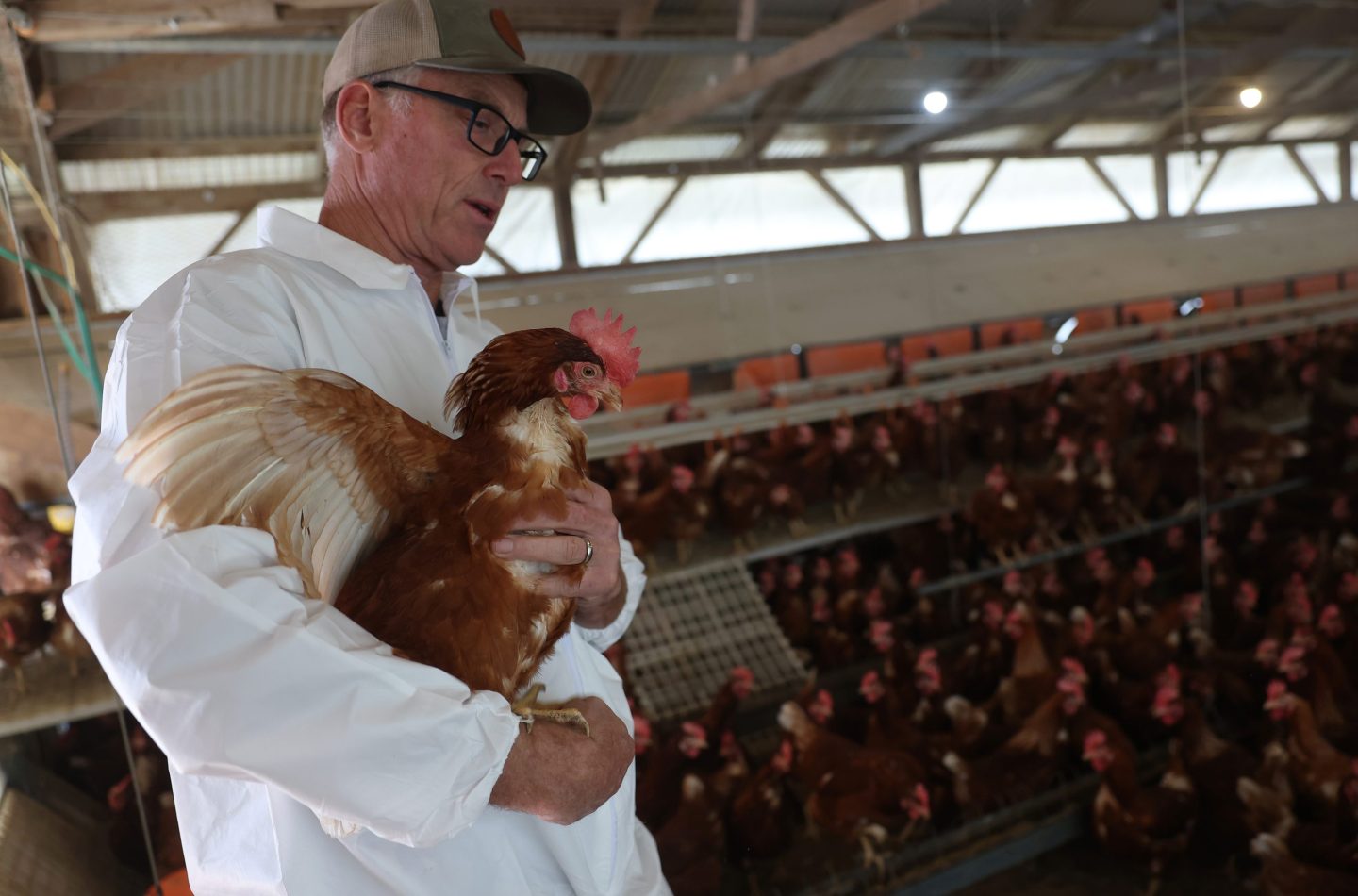- The U.S. Department of Agriculture fired several of its personnel responsible for working to stop the spread of the H5N1 avian flu over the weekend. The agency is now trying to find and rehire those workers. The bird flu has affected more than 160 million birds nationally since 2022, contributing to rocketing egg prices and the endangerment of farm workers.
The U.S. Department of Agriculture is working to rehire employees it fired over the weekend, many of whom were part of the federal government’s efforts to stop the spread of the virulent H5N1 avian flu that has killed millions of livestock and contributed to sky-high egg prices.
“Although several positions supporting [bird flu efforts] were notified of their terminations over the weekend, we are working to swiftly rectify the situation and rescind those letters,” a USDA spokesperson told Fortune in a statement. “USDA’s Food Safety and Inspection Service frontline positions are considered public safety positions, and we are continuing to hire the workforce necessary to ensure the safety and adequate supply of food to fulfill our statutory mission.”
The spokesperson said job categories within the USDA, such as veterinarians and emergency response personnel, were exempted from the sackings.
The H5N1 avian flu has wrought havoc on U.S. agriculture. More than 162 million birds and nearly 1,000 dairy cow herds in the U.S. have been affected by the avian flu since 2022, according to the Centers for Disease Control and Prevention and USDA, which has contributed to about 20 million deaths of egg-laying hens in the last quarter of 2024 alone.
About 70 people in the U.S. have contracted the disease since the 2022 outbreak; the CDC reported the first human death from H5N1 last month.
The elimination of key USDA positions is part of an effort by President Donald Trump and the Department of Government Efficiency to cull thousands of government positions in an effort to overhaul bureaucracy and curb federal spending. Some USDA employees, including those from the National Animal Health Laboratory Network program office overseeing the response to animal-borne disease outbreaks, were notified Friday their jobs would be eliminated, Politico reported.
“They’re the front line of surveillance for the entire outbreak,” Keith Poulsen, director of the Wisconsin Veterinary Diagnostic Laboratory, told Politico. “They’re already underwater and they are constantly short-staffed, so if you take all the probationary staff out, you’ll take out the capacity to do the work.”
Consequences of federal workplace uncertainty
The USDA is the country’s first line of defense in understanding and combating the avian flu because of its access to the farms battling the brunt of the virus’s consequences, according to Jennifer Nuzzo, director of the pandemic center at the Brown University School of Public Health. The agency’s surveillance efforts of farms, such as bulk-testing raw milk for disease, is the primary means of gathering information about the virus and its spread.
Beyond staff shortages siphoning resources from that work, the anxiety around sweeping personnel changes alone may prevent USDA employees from focusing on constraining the virus.
“With this changing policy environment and the uncertainty about all of the…government worker personnel issues, agencies are spending a lot of their time just trying to navigate that highly chaotic and uncertain situation,” Nuzzo told Fortune, “which I believe is interfering with their abilities to fulfill their statutory missions.”
Besides firing thousands of public health workers, the Trump administration has also hampered response to the bird flu outbreak, with the CDC and USDA unable to hold Congressional briefings, meet with state officials, or receive internal reports, according to multiple reports.
The White House did not immediately respond to Fortune’s request for comment.
Widespread economic disruptions
Nuzzo argued more than just federal workers should be alarmed by interruptions to USDA’s work.
“Everybody knows about the price of eggs. Everybody knows how hard it is to even find eggs in the grocery store,” she said. “Understanding how H5N1 is affecting animal populations is essential for protecting our agricultural interests.”
Last week, egg prices hit a record high of $4.95 for a dozen Grade A eggs, the loftiest cost since the 2015 bird flu. The sustained demand for the staple amid surging prices has forced grocers to limit the number of eggs consumers buy and encouraged others to invest in backyard chickens.
Farmers will also feel the economic strain. Beyond putting themselves at higher risk of disease by exposing themselves to animals, poultry farmers who detect H5N1 in their birds are forced to cull the entire flock to prevent disease spread, while dairy farmers may resort to selling their sick dairy cows as beef to cut financial losses.
While farmers can receive government compensation for having to depopulate their farms, it doesn’t make up for their total economic losses. The USDA spent half a billion dollars last year paying poultry farmers who had to cull their flocks because of H5N1.
“The agency that is best equipped to know how to protect those workers—because they understand how farms operate—is Agriculture,” Nuzzo said. “So it is really important that USDA be a full, unrestrained, well-resourced partner in the work to protect these farm workers.”












